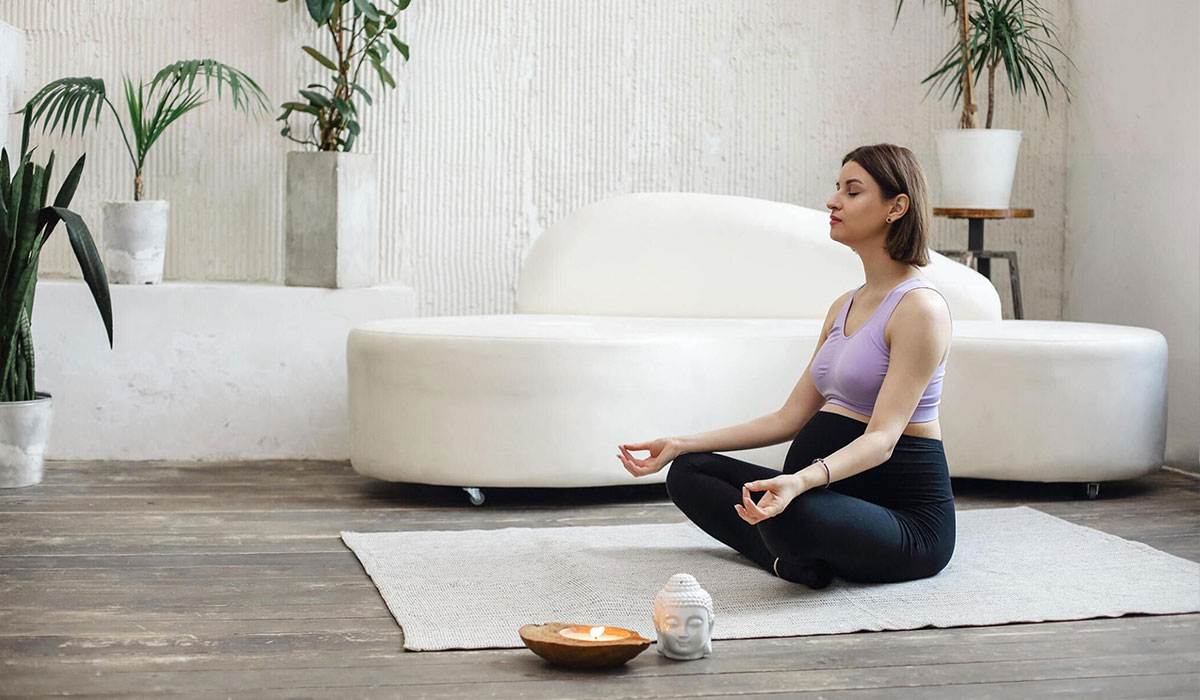Yoga in Daily Holistic Wellness is a practice that goes beyond the physical movements and poses commonly associated with it. It is a holistic approach that aims to unite the mind, emotions, and body into one harmonious entity. When you engage in yoga, you are not just working on your physical flexibility and strength; you are also delving into the realms of mental and spiritual well-being. The breathing exercises, meditation practices, and mindfulness techniques incorporated in yoga help you achieve a sense of balance and wholeness on all levels of your being.
Relationship Between Yoga and Holistic Wellness
The connection between yoga and holistic wellness is deeply intertwined. Yoga serves as a powerful tool to cultivate holistic health by addressing not only the physical body but also the mental and spiritual aspects of a person. When you practice yoga regularly, you are not just improving your physical fitness; you are also enhancing your mental clarity, emotional stability, and spiritual connection. Yoga encourages you to explore the deeper layers of your being and to establish a sense of harmony and unity within yourself. By embracing the holistic approach of yoga, you can experience a profound transformation that nourishes your entire being.
Physical Health Benefits of Yoga
Stimulating the Parasympathetic Nervous System
 Source: integralyogamagazine.org
Source: integralyogamagazine.org
When you practice yoga, you are actively stimulating your parasympathetic nervous system. This is the part of your nervous system responsible for the “rest and digest” functions of your body. By engaging in yoga poses, controlled breathing, and meditation, you signal to your body that it is time to relax and rejuvenate. This can lead to a decrease in stress levels, lower heart rate, and improved digestion.
Improving Physical Flexibility and Strength
Through consistent practice of yoga, you will notice significant improvements in your physical flexibility and strength. The various poses and stretches involved in yoga help to lengthen and stretch the muscles, leading to increased flexibility. Additionally, holding these poses requires a certain level of strength, which gradually builds as you progress in your yoga practice. Improved flexibility and strength not only benefit your physical health but can also enhance your overall quality of life.
Mental Health Benefits of Yoga
Reducing Stress and Anxiety Levels
When you engage in yoga, you actively work towards reducing your stress and anxiety levels. The calming effects of yoga practices help to lower the production of stress hormones in your body, promoting a sense of relaxation and peace. By incorporating breathing exercises and mindfulness meditation into your routine, you can effectively manage your stress and anxiety levels, leading to a more balanced mental state.
Enhancing Sleep Quality and Mental Clarity
Practicing yoga regularly can significantly enhance your sleep quality and mental clarity. The relaxation techniques utilized in yoga, such as deep breathing and meditation, can help calm your mind and prepare your body for a restful night’s sleep. A well-rested body and mind contribute to improved mental clarity, focus, and concentration throughout the day. By prioritizing your sleep and mental well-being through yoga, you can experience heightened cognitive function and overall mental well-being.**Scientific Evidence of Yoga’s Impact on Health**
Improving Knee Function and Reducing Pain
When you engage in regular yoga practice, you can experience improvements in knee function and a reduction in pain. Yoga poses like the Warrior series and Tree pose help to strengthen the muscles surrounding the knee joint, providing support and stability. Additionally, the gentle movements and stretches in yoga can help increase blood flow to the knees, promoting healing and reducing inflammation. By incorporating yoga into your routine, you may find that your knee pain diminishes over time, allowing you to move more comfortably.
Enhancing Immune System Response and Lower-Body Strength
Regular practice of yoga has been shown to enhance the immune system’s response to pathogens. The combination of movement, breathing exercises, and relaxation techniques in yoga can help reduce stress levels, which in turn can bolster the immune system. Additionally, many yoga poses focus on building lower-body strength through poses like Chair pose and Standing Forward Bend. Strong leg muscles not only support daily activities but also help prevent injuries. By incorporating yoga into your wellness routine, you can strengthen your immune system and lower body, leading to better overall health.
Integration of Meditation in Yoga Practice
Harmonizing Mind, Body, and Spirit
As you engage in the regular practice of yoga and incorporate meditation, you are actively working towards harmonizing your mind, body, and spirit. The combination of yoga postures with focused breathing and meditation techniques allows you to bring alignment to all aspects of your being. By immersing yourself in this holistic practice, you can experience a sense of unity within yourself, enhancing your overall well-being and promoting a deeper connection with your inner self.
Promoting Tranquility and Emotional Balance
Through the integration of meditation in your yoga practice, you can promote tranquility and emotional balance in your life. By taking the time to quiet your mind and focus on the present moment during meditation, you allow yourself to release stress and tension, creating a space for emotional healing and balance. This sense of inner calmness can then extend into your daily life, helping you navigate challenges with a more centered and grounded approach. By regularly incorporating meditation into your yoga routine, you can cultivate a sense of peace and emotional stability that enriches your overall quality of life.
Vagal Tone Strengthening Through Yoga
Enhancing Rest and Digest Response
When you engage in regular yoga practice, you can significantly enhance the rest and digest response of your body. By focusing on deep breathing and gentle movements during yoga poses, you stimulate the vagus nerve, which in turn increases your vagal tone. This heightened vagal tone promotes a state of relaxation and aids in improving digestion, reducing inflammation, and lowering heart rate. Incorporating yoga into your routine can help you tap into this powerful mechanism of the parasympathetic nervous system, promoting overall well-being and aiding in stress management.
Balancing the Autonomic Nervous System
Through consistent yoga practice, you have the opportunity to balance your autonomic nervous system. The intricate combination of asanas, pranayama, and meditation techniques in yoga helps regulate the sympathetic and parasympathetic branches of your autonomic nervous system. By engaging in poses that activate the parasympathetic response, such as Child’s Pose or Corpse Pose, you encourage relaxation and a sense of tranquility. On the other hand, dynamic poses like Sun Salutations stimulate the sympathetic nervous system, offering a holistic balance. By incorporating a variety of yoga practices into your routine, you can cultivate equilibrium within your autonomic nervous system, fostering emotional stability and mental clarity.
The Connection Between Yoga and Emotional Wellbeing
Promoting Positive Emotions and Self-awareness
When you engage in regular yoga practice, you have the opportunity to promote positive emotions and enhance self-awareness. Through the mindful breathing techniques and focused movements in yoga poses, you can cultivate a sense of calmness and positivity. By connecting your breath with movement, you become more attuned to your body and emotions, fostering a deeper understanding of yourself. This heightened self-awareness allows you to recognize and address negative thoughts or feelings, leading to an overall improvement in emotional wellbeing.
Addressing Mental Health Issues and Improving Mood
Consistent yoga practice offers a powerful tool for addressing mental health issues and improving mood. The combination of physical postures, breathing exercises, and meditation in yoga helps to calm the mind and reduce stress and anxiety. By incorporating yoga into your routine, you can experience a sense of relief from symptoms of depression or anxiety. The meditative aspect of yoga encourages mindfulness and presence, which can alleviate negative thinking patterns and promote a more positive outlook on life. By embracing yoga as a holistic practice, you can enhance your mental health and uplift your mood.
Importance of Breathwork in Holistic Yoga Practice
Regulating Breathing Patterns and Oxygen Intake
Engaging in holistic yoga practice involves focusing on your breath to regulate breathing patterns and oxygen intake. By consciously aligning the breath with each movement during asanas, you can enhance the efficiency of your respiratory system. This synchronized breathing fosters a sense of control over your breath, promoting proper oxygen exchange in the body and improving overall lung function. Through consistent practice, you can develop a deeper awareness of your breathing patterns, leading to better respiratory health and increased energy levels.
Enhancing Mindfulness and Presence in Daily Life
Integrating breathwork into your yoga practice can significantly enhance mindfulness and presence in your daily life. By paying attention to the breath while holding poses, you cultivate a heightened sense of awareness and focus. This mindful connection between breath and movement helps you stay present in the moment, allowing you to let go of distractions and stressors. As you carry this mindfulness off the mat and into your daily activities, you can experience a greater sense of clarity, calmness, and balance in both your mind and body. Embracing breathwork as an integral part of your holistic yoga practice can transform the way you approach each day, promoting a more grounded and centered way of living.
Conclusion: Embracing Yoga for Holistic Wellness
Bridging the Gap Between Physical and Mental Health
Yoga serves as a powerful tool to bridge the gap between physical and mental health, offering a holistic approach to your overall well-being. By incorporating breathwork and mindful movements, you can address both the physical and mental aspects of your health, creating a harmonious balance in your wellness journey.
Fostering Overall Wellbeing and Self-empowerment
Embracing yoga as a holistic practice not only enhances your physical and mental health but also fosters overall well-being and self-empowerment. Through dedicated practice and mindfulness, you can experience a profound transformation in your approach to life, gaining a deeper connection to yourself and the world around you. Yoga empowers you to take charge of your well-being, promoting a sense of self-awareness, inner strength, and balance in all aspects of your life.

